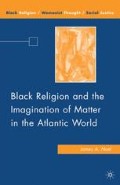Abstract
Although very few scholars of black religion have heeded his advice, Charles H. Long has been recommended situating the study of black religion within the Atlantic World’s geo-temporal framework for quite some time. In 1983 Winthrop S. Hudson had called for situating the study of black religion within its broader American context. One foci of his criticism were scholars who, in his estimation, overemphasized the African roots of black religion. Hudson felt this trend would only produce diminishing returns due to, among other factors, the limited amount of historical data pertaining to African religions during the period of African’s transport to the Americas. Hudson felt historians should “shift their focus from possible distant antecedents to less remote forebears who adopted Christian faith in the midst of desperate circumstances and fashioned from it a church life of their own.”1 He noted that this preoccupation with African retentions has its parallel in the tendency among white church historians, particularly Protestants, to attribute the character of their ecclesiastical bodies to as remote historical origins as possible. What Hudson does not say, but something we can easily observe, is that the preoccupation with origins lying somewhere in antiquity—that is, the Apostolic period—conforms very easily with white supremacist’s preoccupation over purity.
Here we are speaking not of fantasies but of a community, a community listening to the sounds and words of each other, and if there is something fantastic about this experience, such must obviously be present… For in this one moment of experience the immediacy of experiencing outside the veil and double consciousness is afforded.
—Charles H. Long, Significations, p. 169.
Access this chapter
Tax calculation will be finalised at checkout
Purchases are for personal use only
Preview
Unable to display preview. Download preview PDF.
Notes
Winthrop S. Hudson, “The American context as an Area for Research in Black Church Studies,” Church History 52 no. 2 (1983), p. 157.
See for example: Lawrence W. Levine, “African Culture and Slavery in the United States”; Albert J. Raboteau, “African Religions in America: Theoretical Perspectives,” in Global Dimension of the African Diaspora, Second Edition, ed. Joseph E. Harris (Washington, DC: Howard University Press, 1993).
Jack P. Greene, “Beyond Power: Paradigm Subversion and Reformulation and Re-creation of the Early Modern world,” in Crossing Boundaries: Comparative History of Black People in Diaspora, ed. Darlene Hine and Jacqueline McLeod (Bloomington: Indiana University Press, 1999), p. 377.
Michael P. Smith, Spirit World: Photographs and Journal (Gretna, LA: Pelican, 1932), p. 31.
Copyright information
© 2009 James A. Noel
About this chapter
Cite this chapter
Noel, J.A. (2009). Conclusion. In: Black Religion and the Imagination of Matter in the Atlantic World. Black Religion/Womanist Thought/Social Justice. Palgrave Macmillan, New York. https://doi.org/10.1057/9780230620810_10
Download citation
DOI: https://doi.org/10.1057/9780230620810_10
Publisher Name: Palgrave Macmillan, New York
Print ISBN: 978-1-349-37869-2
Online ISBN: 978-0-230-62081-0
eBook Packages: Palgrave Religion & Philosophy CollectionPhilosophy and Religion (R0)

